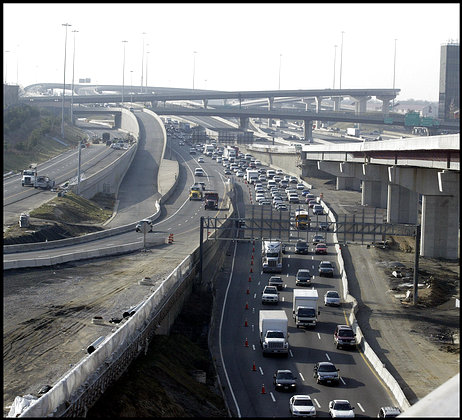 Joe Hoyle in our Business School wanted to know more about this word, also spelled “kludge” (and pronounced “klooj”) on occasion. A kluge, involving how we connect to campus services from off campus, delayed this post. It’s one of the worst kluges in how we use technology. But more on that in a bit.
Joe Hoyle in our Business School wanted to know more about this word, also spelled “kludge” (and pronounced “klooj”) on occasion. A kluge, involving how we connect to campus services from off campus, delayed this post. It’s one of the worst kluges in how we use technology. But more on that in a bit.
I’ve always thought of kluges as dangerous, makeshift repairs such as the one pictured. Yet there is more to it than that. The Atlantic ran a story, “The Appropriately Messy Etymology of ‘Kluge’ ” that shows how murky the term’s origins have proven. At the same time, the usage remains clear: a kluge means an ad-hoc solution, usually technological, with hardware or software. It gained currency in the era of computer science. A kluge is the opposite of an elegant solution.
The piece in The Atlantic cites other kluges in our daily lives, such as the bolted-together labyrinth of the US Federal tax code. I’d add the Interstate System, where no matter how many lanes we build, it never quite works and can grind to a halt after a single breakdown. That’s why I avoid Interstate travel at all costs, going by US Route or train.
Yet no advanced part of our transit system merits the word “kluge” more than certain airports. Newark springs to mind, as does O’Hare. Yet Heathrow is my favorite kluge of all.
No matter how often it gets a facelift or wonderful new terminal, it remains delightfully or maddeningly (depended on your departure time) “higgledy-piggledy,” to use a British term. I’ve gone up a flight of stairs at Heathrow, down a hall, turned 180 degrees, down a flight of stairs, all to end up in sight of where I began. If that is not a kluge, I do not know what is.
Shall we then get a ruling from that most UK of authorities on vocabulary, the OED? As fate has it, another kluge–the way we establish security online: a labyrinth of passwords, VPN connections, dual-factor authentication, casting of spells and praying to dark gods, so-called “secure clients” delayed me. It took two days to consult the OED online, then publish a notice of this post to Spiderbytes, our campus e-mail list.
I finally got through the decidedly klugey process to the OED; the entry there notes that our word as slang of recent origin, for a system improvised, lashed together, in the end “forming a distressing whole.’ ” That’s I-95, Heathrow, or my password list.
The earliest example of our word comes from 1962: The word ‘kludge’ is..derived from the same root as the German Kluge.., originally meaning ‘smart’ or ‘witty’… ‘Kludge’ eventually came to mean ‘not so smart’ or ‘pretty ridiculous’.
There must be a better way for getting to content behind a paywall or password gate than our current kluge: Iris scans? Blood sample? Replacing the kluge we currently use to identify ourselves online should be on the to-do lists of every major software company. Go ahead: invent it and you, not Elon Musk, will be teh first to land a big silver passenger rocket on Mars.
We’ll continue the blog through exams and the holiday break, so please send us words and metaphors useful in academic writing by e-mailing me (jessid -at- richmond -dot- edu) or leaving a comment below.
top image courtesy of the Facebook group “Bikers and Riders.” Do not try that at home. Mixing Bowl I-95 kluge courtesy of Richard Layman at Flickr.
